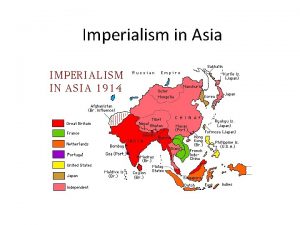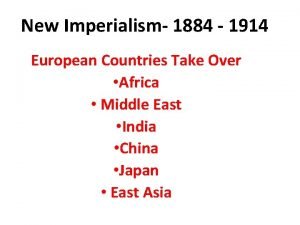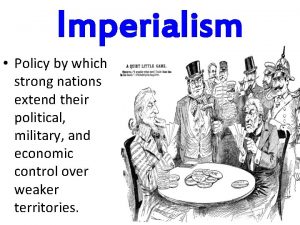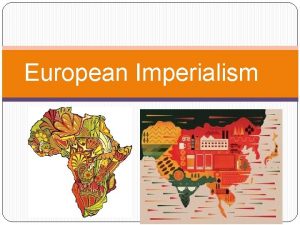Imperialism Europe Reaches Out European Imperialism Imperialism refers
















- Slides: 16

Imperialism: Europe Reaches Out

European Imperialism �Imperialism refers to the political and economic control of one area or country by another �In the 15 th century, European nations developed the first overseas empires in the Americas �The independence of the United States and Latin America represented a great setback for European Imperialism �In the 19 th century (1800’s), the European Great Powers suddenly acquired vast colonial empires in Africa, Asia, and the Pacific.


The “New Imperialism” �At the end of the 18 th century, imperialism appeared to be on the decline. The loss of their empires in the Americas led countries to question the value of Imperialism �From 1880 -1900, almost every corner of the Earth came to be claimed by European powers. �The world was carved up among the European Powers

Causes of “New Imperialism” �New technological developments, based on the Industrial Revolution mad the “New Imperialism” possible. �The steamboat made it possible to go upstream, reaching the interior of Africa and other places previously too difficult to reach �The telegram made it possible to communicate with new settlements deep in the interior regions of Africa and Asia �Railroads allowed imperial powers to ship goods and raw materials to and from their colonies �New medicines and better understanding of disease allowed for the exploration of the tropics with less risk �Military technology, like rifles, could be used to control local people


Motives for “New Imperialism” �New countries such as Belgium, Germany, and Italy sought colonial empires of their own to establish their power on the world stage �Old Powers like Britain and France aimed to reassert their power �European powers were also anxious to preserve the “balance of power” �They wanted to obtain natural resources and markets to sell their goods, as well.

Recapping Reasons for Renewed Interest in Imperialism �Technology New technology—such as steamships, rifles, telegraphs, & better medicines—made it possible to reach further, impose their will, coordinate better, and do so safely �Economic Motives European industries needed raw materials to keep their factories busy. Industrialists sought new markets in which to sell ther manufactured goods �Political Motives Europeans wished to acquire colonies to demonstrate their power and to preserve the balance of power among themselves. When one country obtained a new colony, others felt the need to do the same. �Social Motives Many Europeans believed in Social Darwinism & felt it was their duty to conquer and civilize “lesser people” Some Europeans justified their actions with spreading Christianity

Social Darwinism �Darwinism- “Survival of the Fittest” �Darwin’s theory of Evolution was introduced in the mid-1800’s and stated that some species survive, while others die off, because those surviving species were more advanced, fit, and well equipped to survive �Social Darwinism—the theory that some societies were more successful because their cultures were superior. This theory applied Darwin’s theory to humans based on social and ethnic characteristics It was used to justify racism and Imperialism in the 19 th Century


Social Darwinism “Take up the White Man’s burden— Send for the best ye breed— Go, bind your sons to exile To serve your captives’ need; To wait, in heavy harness, On fluttered folk and wild— Your new-caught sullen peoples, Half devil and half child…” --Rudyard Kipling, 1899

British Imperialism: India �Britain defeated India, during the 18 th century, and extended their control over the Indian subcontinent Next they seized Egypt to protect the Suez Canal , which provided the shortest route from Britain to India �British rule brought many changes to India They outlawed the ritual of a wife committing suicide when their husband’s died The first railway in India was built in 1853 India, which was made up of Muslims and Hindus, began to have Christian missionaries descend upon them Despite the progress Britain often brought, Indians still resented the challenge to their traditional ways.

Sepoy Mutiny �The British were able to control India because Indians were divided among themseves �The British had better weapons and used trained Indian soldiers, known as “Sepoys” �In 1857, a large number of Sepoys rebelled, but the British crushed the revolt using loyal Indian soldiers �After the mutiny, the British took formal control of India and India officially became a British possession

Impact of British Rule on India �Government The British provided a single system of law and government, which unified India They provided jobs, increased educational opportunities, and introduced English as a unifying language �Economic The British built roads, bridges, and railroads and set up telegraph wires. However, India’s cottage industries were hurt by competition with Britain’s manufactured goods �Health The British built hospitals, introduced medicines, and provided famine relief. Health care improvements led to a population explosion �Social Indians were looked down upon by the British and Indian workers were seen as a source of inexpensive labor

Other British Colonies �Britain also held several other colonies outside India. �It took Cape Colony, on the tip of South Africa, several islands in the West Indies, Canada, Australia, New Zealand, and Singapore

Other European Colonies �France Colonies in the West Indies Colonies in West Africa and India Indochina �Spain Philippines Cuba Puerto Rico
 One direction shot me out of the sky
One direction shot me out of the sky European imperialism in africa and asia webquest answers
European imperialism in africa and asia webquest answers European imperialism in africa
European imperialism in africa Asia imperialism
Asia imperialism Imperialize synonym
Imperialize synonym The driving force behind european imperialism in africa
The driving force behind european imperialism in africa We can understand from the reading that opera
We can understand from the reading that opera Imperialism refers to the policy in which strong nations
Imperialism refers to the policy in which strong nations Africa 1890
Africa 1890 Old imperialism motives
Old imperialism motives Military expeditions carried out by european christians
Military expeditions carried out by european christians What happens when action potential reaches axon terminal
What happens when action potential reaches axon terminal What stops following montag once he reaches the river?
What stops following montag once he reaches the river? When a wave reaches a boundary it
When a wave reaches a boundary it Food adulteration reaches new height
Food adulteration reaches new height True labour contractions
True labour contractions The farther reaches of human nature
The farther reaches of human nature































